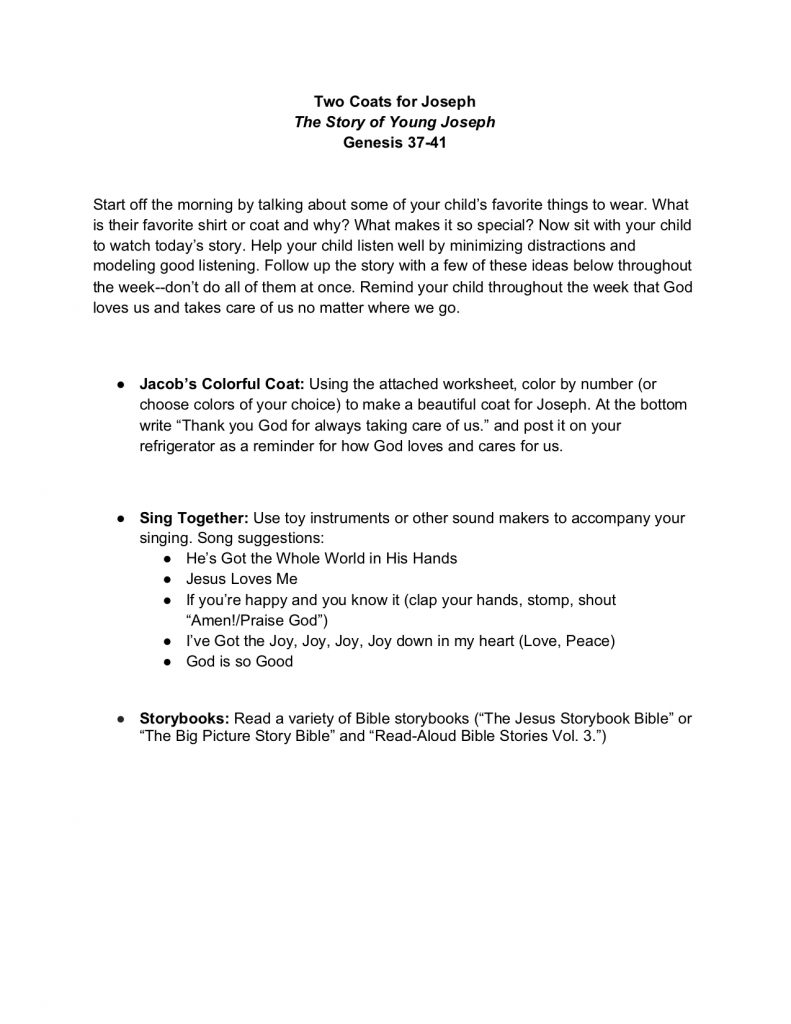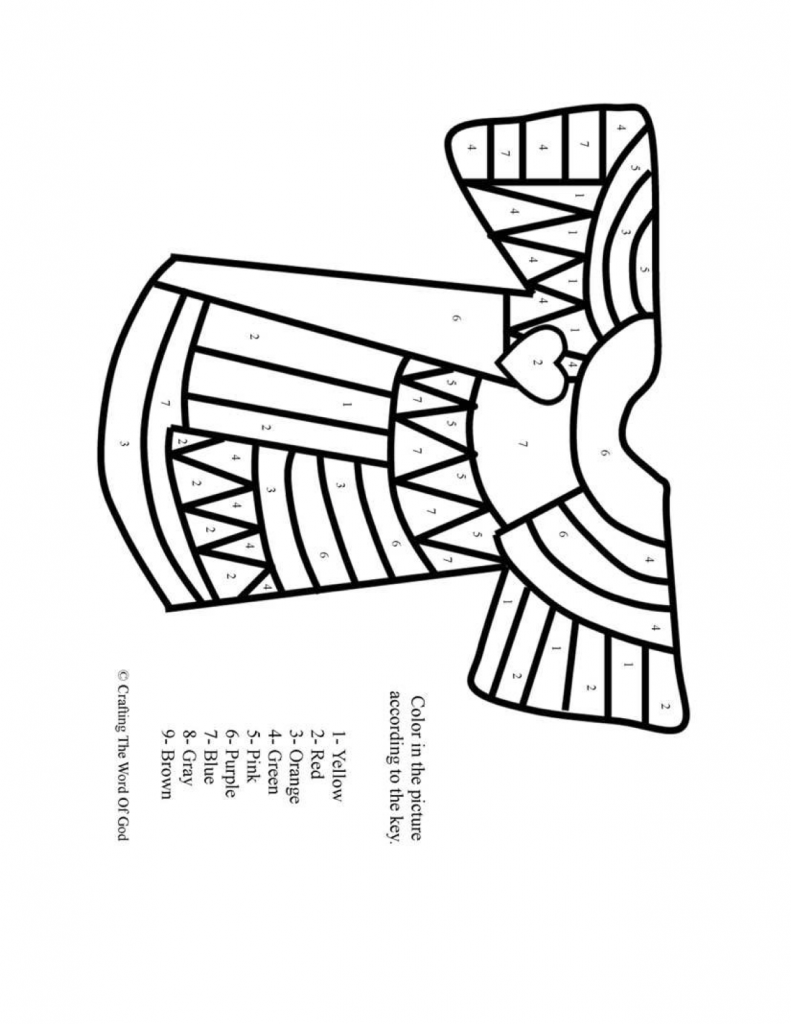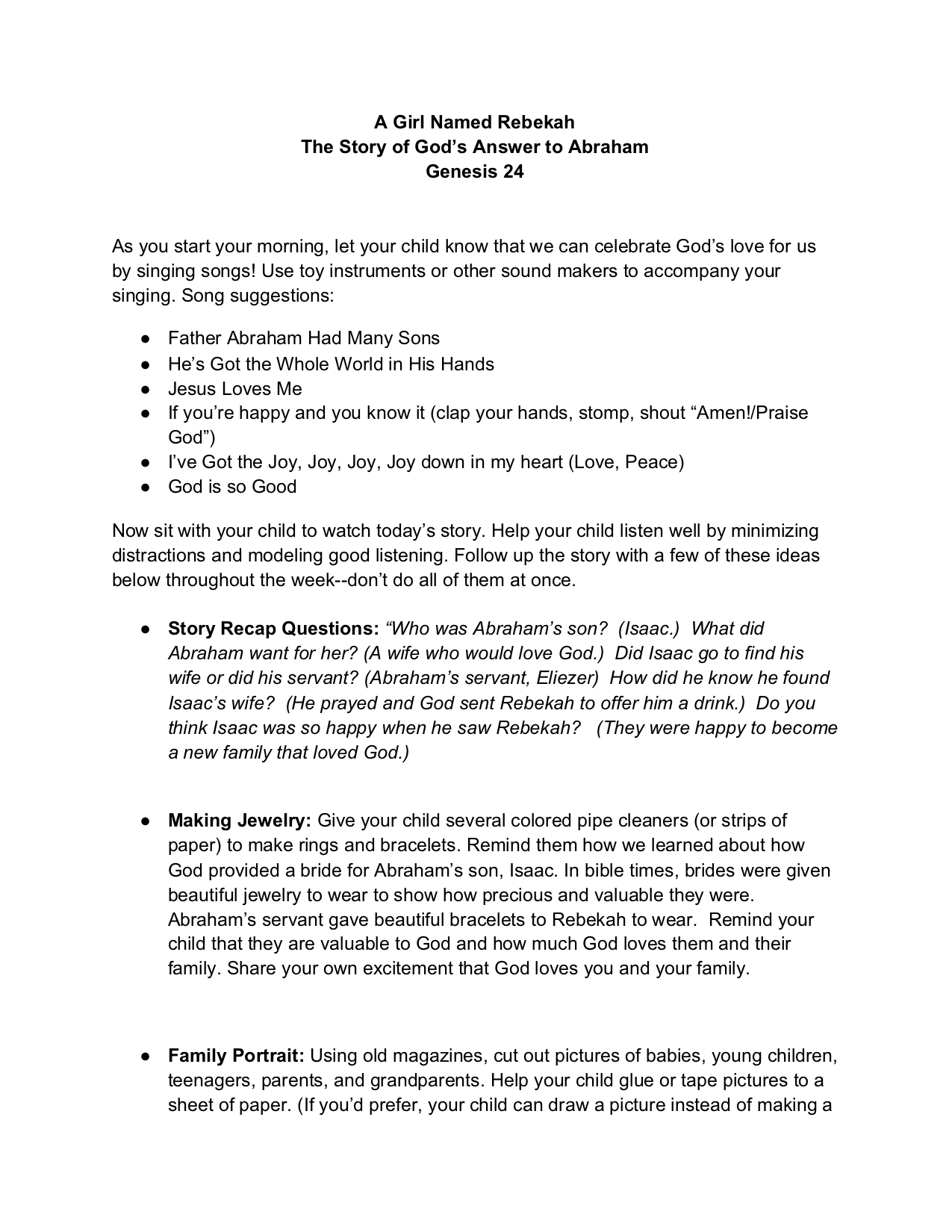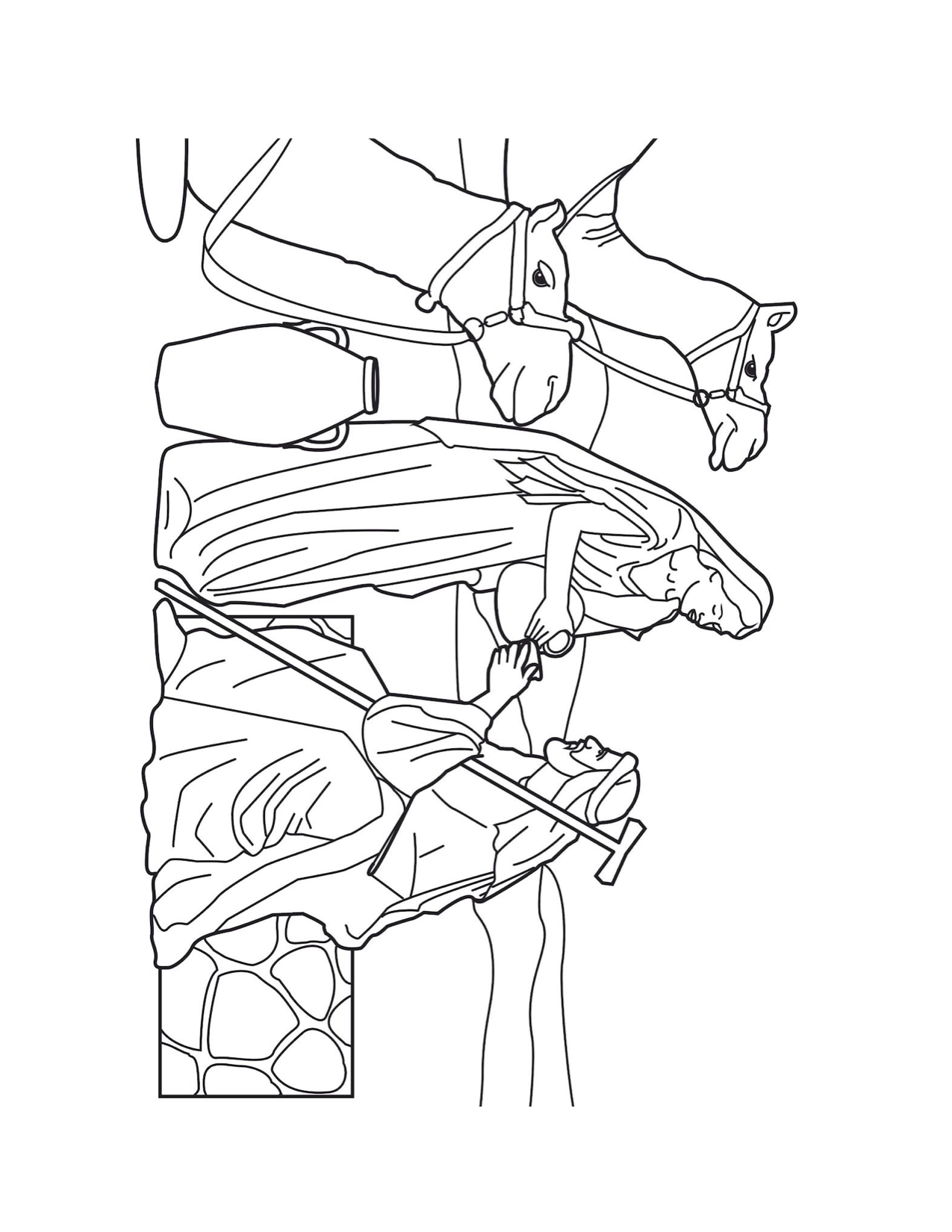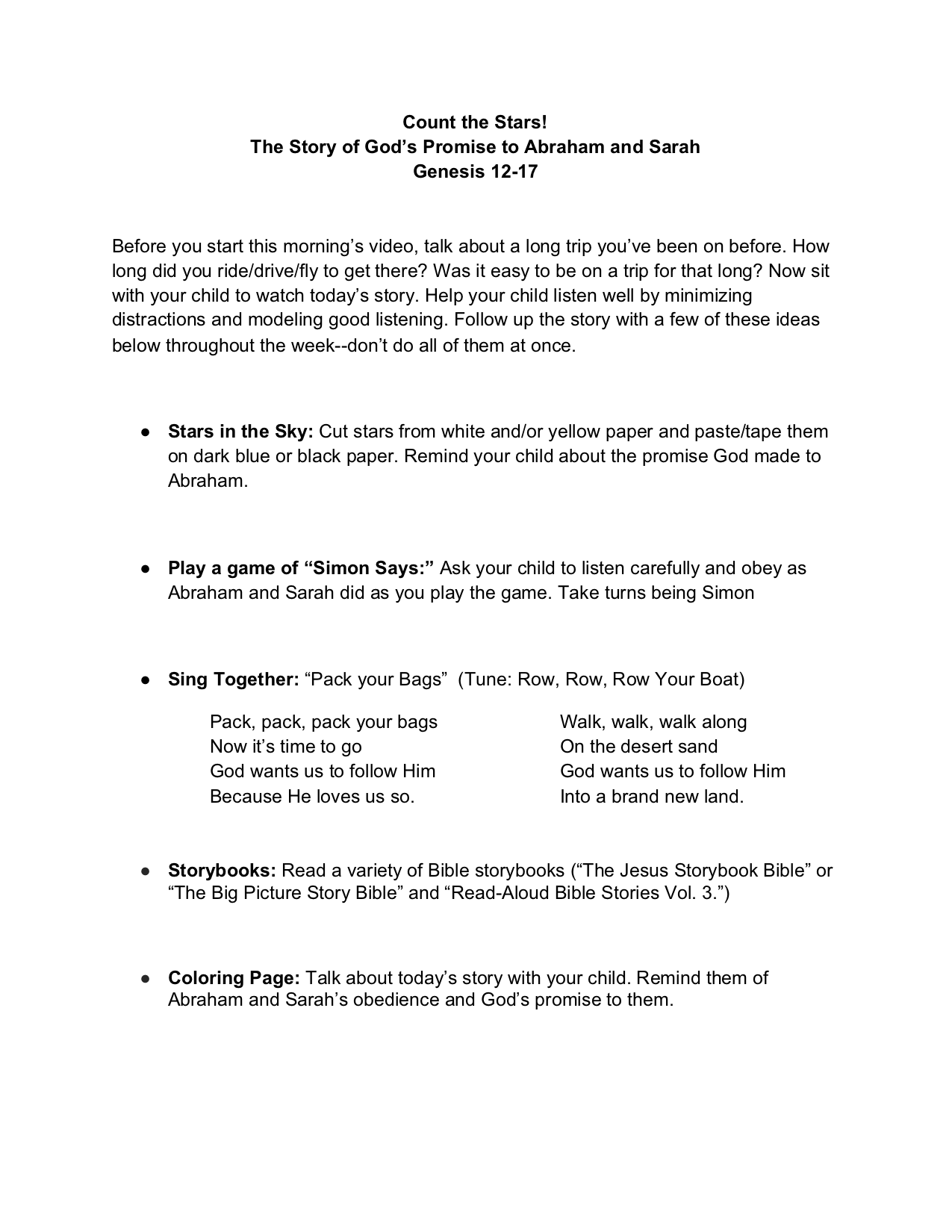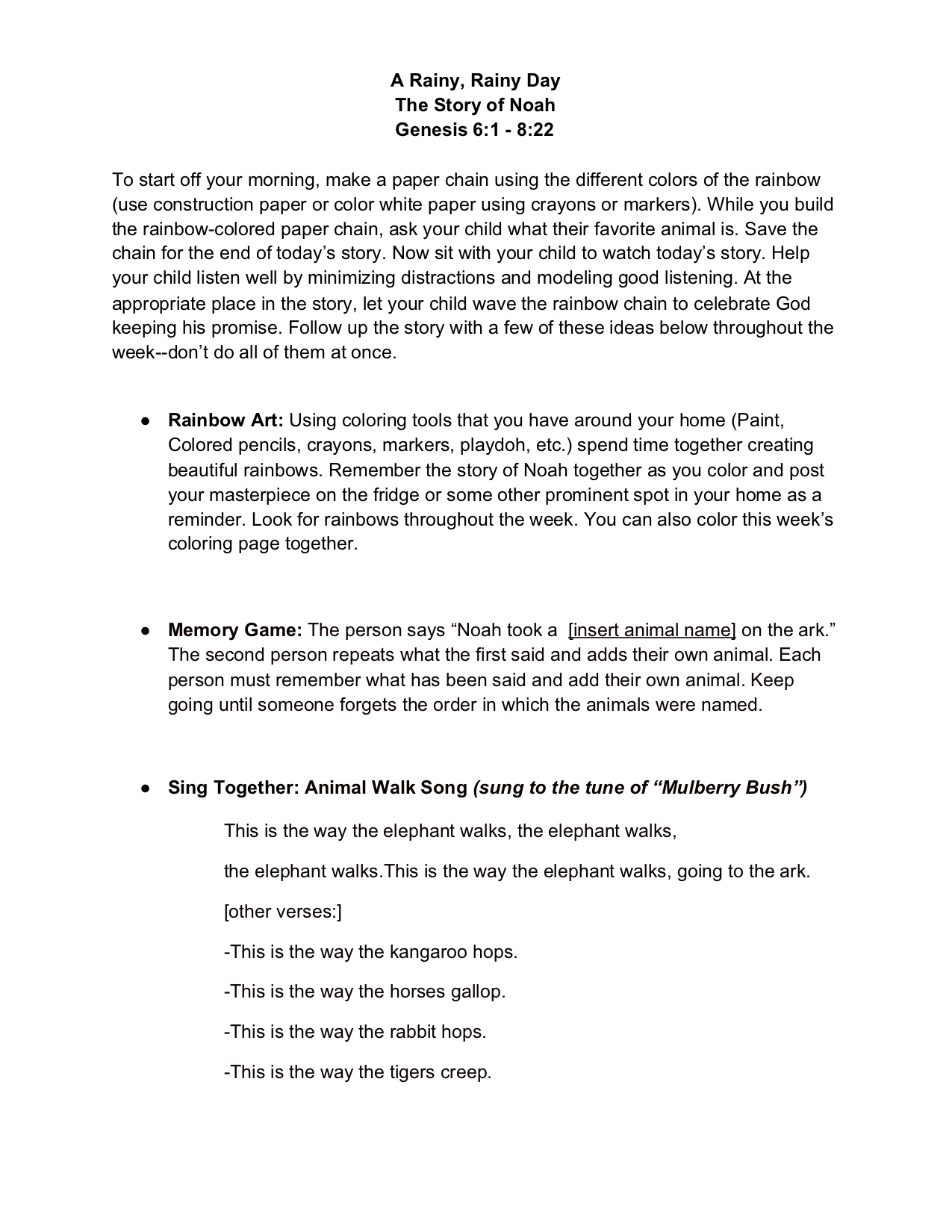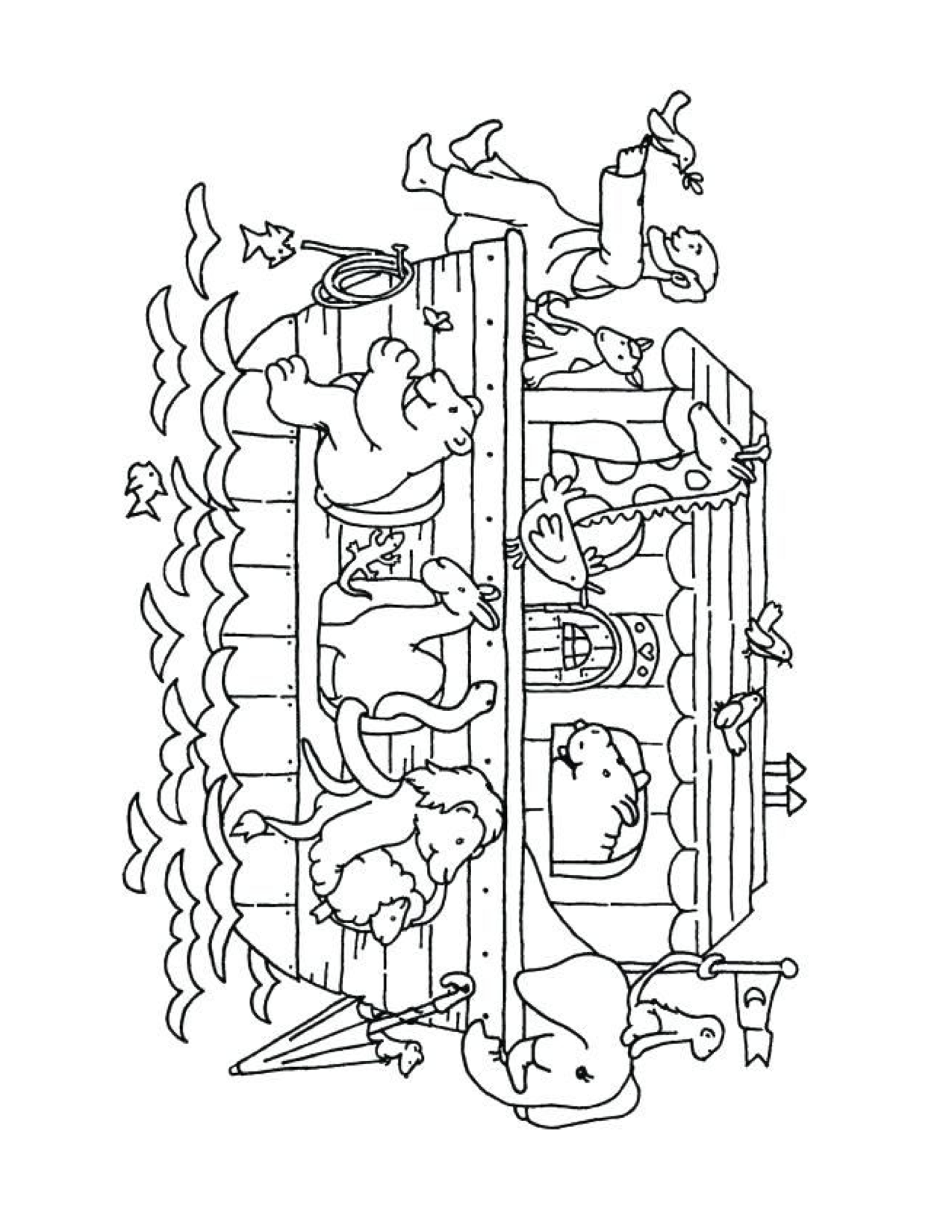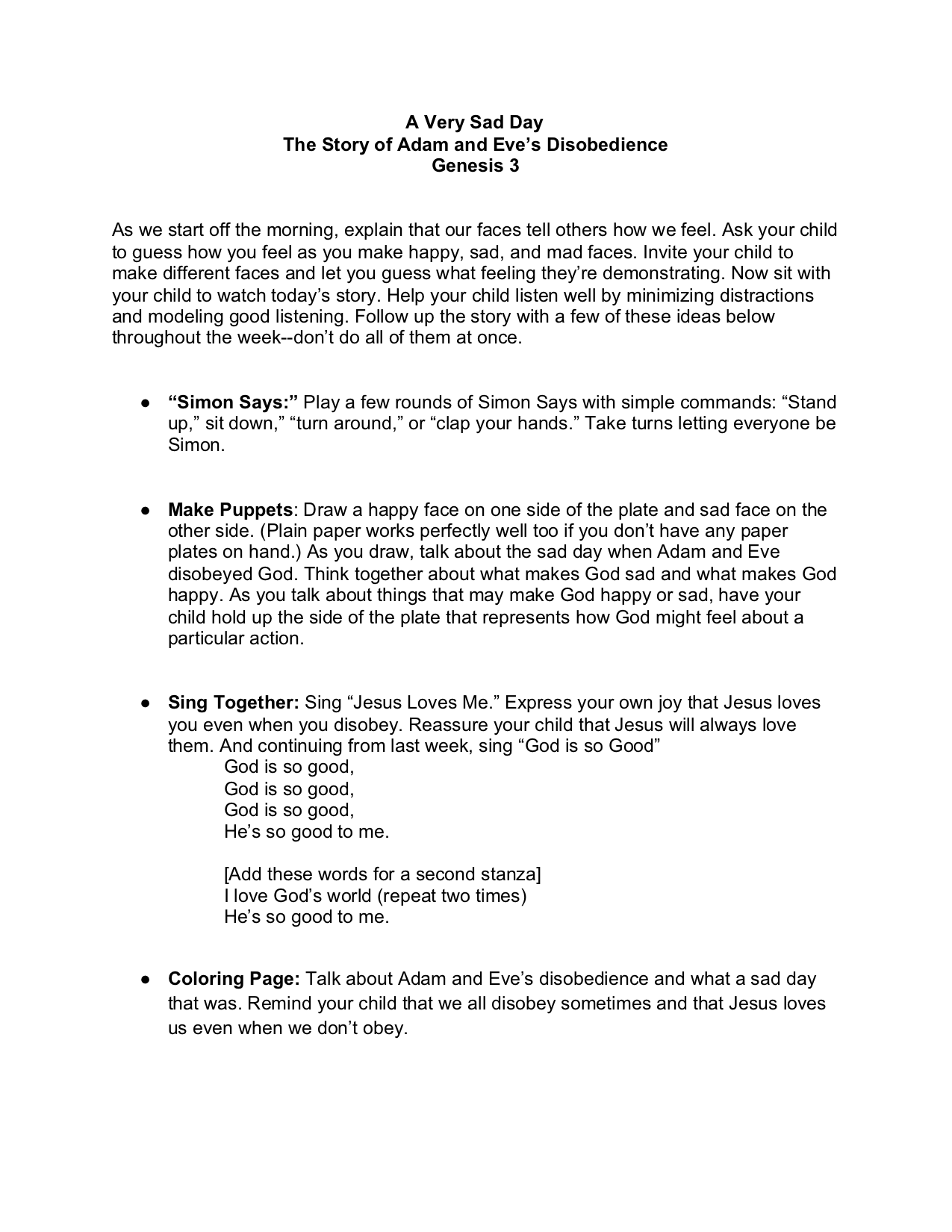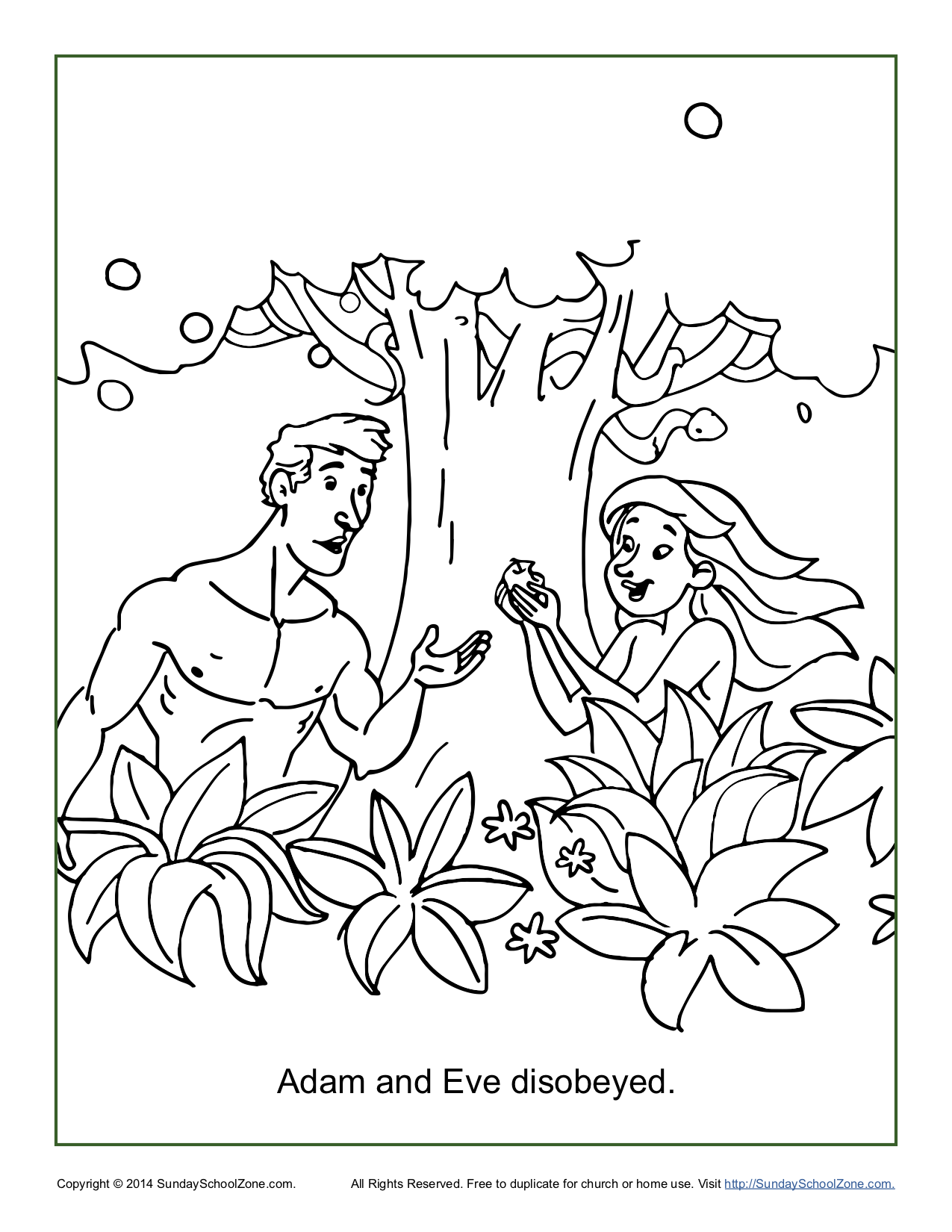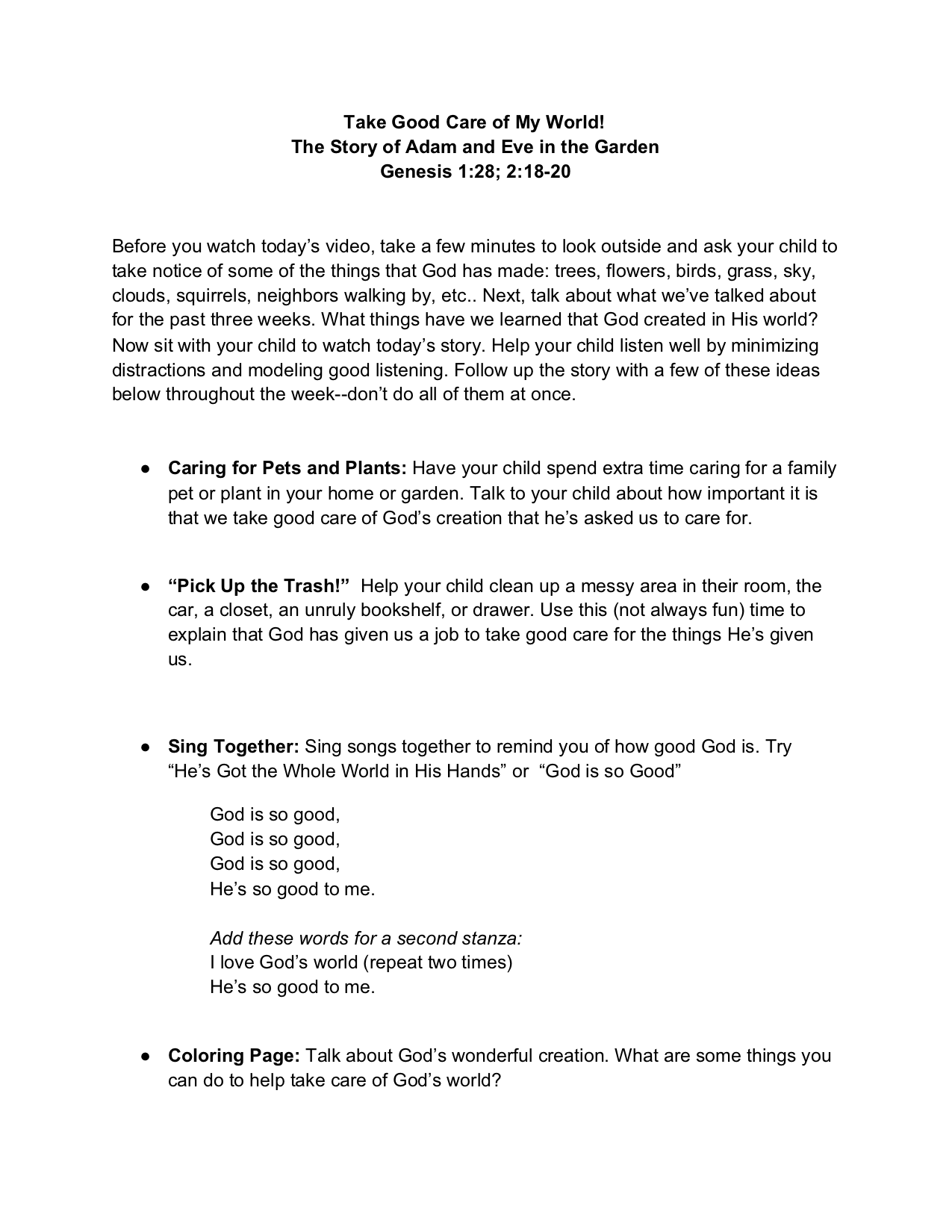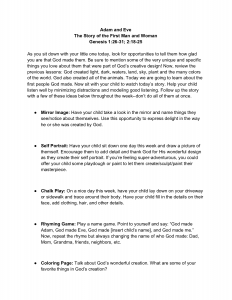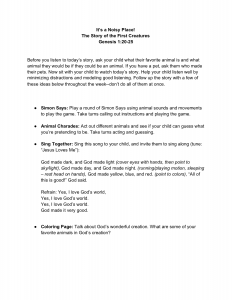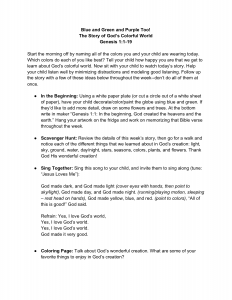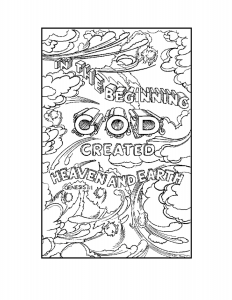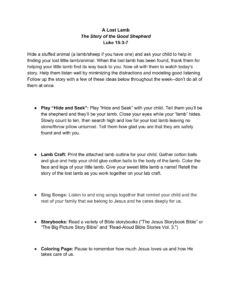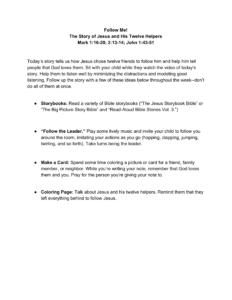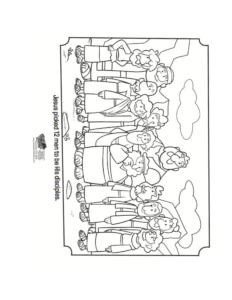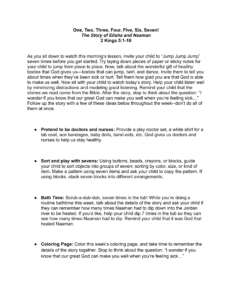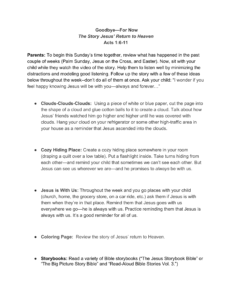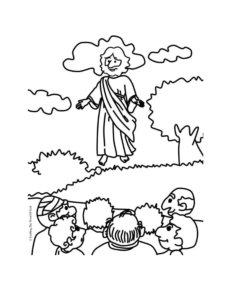A Girl Named Rebekah: The Story of God’s Answer To Abraham
Laura2021-11-27T14:00:33-05:00November 27th, 2021|
Count The Stars! The Story of God’s Promises to Abraham & Sarah
Laura2021-11-20T14:01:39-05:00November 20th, 2021|
A Rainy, Rainy Day – The Story of Noah
Laura2021-11-13T14:00:24-05:00November 13th, 2021|
A Very Sad Day – The Story of Adam and Eve’s Disobedience
Katie2021-10-27T16:14:51-04:00November 6th, 2021|
Take Good Care of My World! The Story of Adam and Eve in the Garden
Laura2021-10-30T14:01:23-04:00October 30th, 2021|
Adam and Eve – The Story of the First Man and Woman
Erin2021-10-23T14:01:26-04:00October 23rd, 2021|
Finding Life: Session 10
Erin2021-10-19T13:09:05-04:00October 19th, 2021|
Finding Life in the Church
1. Opening up
- Review: Last week we discussed how the Holy Spirit empowers us to live out God’s purpose for our lives. This past week, was it helpful to think more about the Holy Spirit with you? How does knowing about the Holy Spirit encourage you?
- Today: This week we want to see how the Holy Spirit doesn’t want us to be alone, but wants us to be part of the body of Christ. The Holy Spirit’s plan for you is to be a part of the church.
- Pray: Ask the Holy Spirit to open your hearts and guide your time.
Transition: Let’s start by imagining a situation…
2. What is the Church?
- Read together: Imagine that you and your family were traveling to a far-away foreign country. On your way there, you had a flight layover in a different country, and were forced to spend the night there. As you walked around you began to realize that this was a place that wasn’t necessarily friendly to Americans. In fact, this particular country didn’t agree with anything that America stood for and sometimes it was downright hostile towards Americans. But even though this particular city gave you a strange feeling, you began exploring it because you were hungry for dinner. And then it happened. When you finally stopped for some dinner, you all realized that you were missing a bag. And of all the bags to lose, this one had all of your passports and travel documents. If that were you, what would you do?
- An Embassy: there are probably several good ideas you could come up with, but at some point, you would need to go to the Embassy. A U.S. Embassy is made-up of a group of Americans who live in a foreign land who are there to assist and help U.S. citizens who live in or travel to that country. Even though you were foreigners, as soon as you stepped into that Embassy, it would feel a bit like home. You would be greeted by American citizens and everything from the language used to the decorations around you, would remind you of home.
- Now, with that in mind, let’s read Philippians 3:20.
- Philippians 3:20 says “But our citizenship is in heaven, and from it we await a Savior, the Lord Jesus Christ.” Here’s the point: when you become a follower of Jesus, you instantly become a citizen of heaven (God’s kingdom). You’re still a citizen of the place you live, or your home country on earth, but your main citizenship is now in God’s kingdom. You belong to God and as a result the Bible often refers to you as a foreigner or an exile. Why? Because your main citizenship is in heaven and you aren’t there yet!
- The church. Think back to our discussion about the U.S. Embassy. One way to think about the church is that it’s an embassy. How do you think the church is like an embassy?
- Parents: highlight the fact that as God’s people, heaven is now our ultimate home. Even though we are still very much a part of this earth – loving our neighbors, caring about our world, and loving our city – we are first and foremost citizens of God’s kingdom. If that’s the case then the church gathered is like an embassy because it reminds us of our heavenly citizenship. It also is a place where we help each other live in a foreign land. And it’s a place where skeptics can come and get a glimpse of heaven – they can observe what it looks like when a group of people love God and each other.
- Here’s the point: The church gathered is the place where God’s Kingdom is represented, where we confess allegiance to King Jesus, and where we help each other live in a place that isn’t our home. And that means the church isn’t a building, it’s the people of God who believe in Jesus.
- The church. Think back to our discussion about the U.S. Embassy. One way to think about the church is that it’s an embassy. How do you think the church is like an embassy?
Transition: So what exactly happens when the church gathers?
3. What does the Church do?
- Question: What are some things the church does when we gather together?
- You can probably think of several answers. Let’s highlight a few:
- 1) The church worships God.
- Question: why do you think this is first?
- Answer: God deserves our worship. Think about the greatest sights you’ve ever witnessed in nature, or the most impressive machines or technology, or the greatest sports accomplishments – all of it pales in comparison to God. He is greater than all of it, so he deserves to be sung about, spoken to with praise, and magnified for all to see. And, he made us to delight in him. When we really worship him, our hearts begin to sing with joy and happiness. It’s what we were made for. And we’re made to do it together.
- 2) The church nourishes souls by proclaiming the Gospel.
- Imagine that someone stopped eating for several days. Eventually their body would begin to breakdown. Their malnourishment would lead to sickness, weakness, and worse. We know that about our bodies, but we don’t think about it when it comes to our souls. But even more than our bodies, our souls need to be “fed.” If our souls are malnourished then our lives will show it in many different forms of brokenness and sadness. So here’s the beauty of the church: when we gather together and proclaim the Good News of Jesus’s life, death, and resurrection, our souls get fed. We really, really need to feed on God’s Word and it’s central message: the greatness of Jesus and His work for us.
- Question: If this is the case, what should you look for when you’re looking for a church to belong to?
- Answer: a church that preaches the true Gospel of Jesus Christ, all the time!
- 3) The church loves one another.
- Shortly before Jesus went to the cross, this is what he told his disciples: “By this all people will know that you are my disciples, if you have love for one another” (John 13:35). Jesus’s words are very clear: the way the world will be able to recognize that you are my followers is that you really, actually love each other! Jesus wants us to love all people (our neighbors) but that starts with loving his people.
- Question: What are some different ways people in the church could show love for each other?
- Answer: brainstorm together. The list could include: asking about each other, getting to know others in the church, trying to meet new and different people in the church, caring about someone’s highs and lows in life, praying for each other, providing food or resources or money someone faces a hardship, walking with someone through a really hard time in life, and so on!
- 4) The church equips the saints.
- Paul uses this phrase in Ephesians 4. He said that people in the church have all sorts of different gifts and different callings, and a very important part of what the church does is to prepare people to be disciples in all of life. How should you be a follower of Jesus at school, in the workplace (when you have a job), in your neighborhood, in your home, when you’re on your screen and no one is around? The church is here to help you think about that, and to prepare you to love God and love people in all those different places.
- Imagine that someone stopped eating for several days. Eventually their body would begin to breakdown. Their malnourishment would lead to sickness, weakness, and worse. We know that about our bodies, but we don’t think about it when it comes to our souls. But even more than our bodies, our souls need to be “fed.” If our souls are malnourished then our lives will show it in many different forms of brokenness and sadness. So here’s the beauty of the church: when we gather together and proclaim the Good News of Jesus’s life, death, and resurrection, our souls get fed. We really, really need to feed on God’s Word and it’s central message: the greatness of Jesus and His work for us.
Transition: thinking about equipping us for ministry, brings us to the last point. The church’s mission…
4. What is the Church’s mission?
- Read Ephesians 4:11-12: “And he gave the apostles, the prophets, the evangelists, the shepherds and teachers, to equip the saints for the work of ministry, for building up the body of Christ.”
- Here is the verse we just mentioned. Paul wants us to understand that Jesus gave the church these different kinds of people to equip the saints for the work of ministry. Now Paul already said in Ephesians 2, that the apostles and prophets were part of the foundation of the church. The church’s foundation is not being built-up anymore, so we don’t have prophets and apostles anymore. But we do have “evangelists, shepherds, and teachers,” which are several names to describe pastors and church elders. Paul says their job is to equip or prepare Christians (saints) for the work of the ministry. So what does that mean?
- All Christians are involved in the work of ministry. Sometimes people describe a pastor or missionary as being in full-time ministry, but we’re all involved in ministry. All Christians – wherever they are and whatever calling they have – are there to do the work of the ministry.
- So what is our ministry?
- Here is the verse we just mentioned. Paul wants us to understand that Jesus gave the church these different kinds of people to equip the saints for the work of ministry. Now Paul already said in Ephesians 2, that the apostles and prophets were part of the foundation of the church. The church’s foundation is not being built-up anymore, so we don’t have prophets and apostles anymore. But we do have “evangelists, shepherds, and teachers,” which are several names to describe pastors and church elders. Paul says their job is to equip or prepare Christians (saints) for the work of the ministry. So what does that mean?
- If you can think back to our discussion about following Jesus, we already answered this question. What does it mean to follow Jesus?
- Love God and love neighbor. That’s it! That’s your calling and that’s the church’s calling. And Jesus added a little more detail. We love our neighbor by caring about their needs and sharing the Gospel. This is how he said it:
- Matthew 28:19-20: “Go therefore and make disciples of all nations, baptizing them in the name of the Father and of the Son and of the Holy Spirit, teaching them to observe all that I have commanded you. And behold, I am with you always, to the end of the age.”
- That is the mission of the church. And that’s your mission.
- Question: Do you think it’s easier to do a job together or with a group of people, all helping each other?
- It should be obvious to us that it would be easier to accomplish the mission together, with other Christians, but we don’t always live that way. Parents, if you can share a personal story of making this realization, it would be helpful. If not, you can share the following: When I (Jordan) went to college, I thought I could do the mission of the church without the help of others, without being involved with a church or a strong group of Christians. What I found out, is that it’s really hard to reach people all by yourself. But in time, God taught me that if I was connected to the church, that together we could build up the body of Christ, by caring for each other and reaching new people with the Gospel. So learn from my mistakes – even after you grow up and leave home, keep on staying connected to the church. Look for a good church that preaches the Gospel all the time, and God will use it to help you follow Jesus and join his mission in the world.
- Love God and love neighbor. That’s it! That’s your calling and that’s the church’s calling. And Jesus added a little more detail. We love our neighbor by caring about their needs and sharing the Gospel. This is how he said it:
Transition: we’ve talked about a lot, so let’s remember the big picture…
5. The BIG Picture GOAL: The church needs you and you need the church. God told Adam in the garden, people were not made to live alone. Especially as followers of Jesus, we need each other to find true life and to share it with the world.
6. For next time…
- Pray: Each day ask the Holy Spirit to help you think of someone you could bless in the church.
It’s a Noisy Place: The Sort of the First Creatures
Erin2021-10-16T14:01:57-04:00October 16th, 2021|
Blue and Green and Purple Too: The Story of God’s Colorful World
Erin2021-10-09T14:00:59-04:00October 9th, 2021|
A Lost Lamb – The Story of the Good Shepherd
Katie2021-05-30T14:21:42-04:00July 31st, 2021|
Follow Me! The Story of Jesus and His Twelve Helpers
Katie2021-05-19T21:47:58-04:00May 22nd, 2021|
One, Two, Three, Four, Five, Six, Seven! – The Story of Elisha and Naaman
Katie2021-04-15T11:40:49-04:00April 17th, 2021|
Goodbye—For Now: The Story Jesus’ Return to Heaven
Katie2021-04-22T17:35:54-04:00April 10th, 2021|
Finding Life: Session 9
Erin2021-01-30T17:31:17-05:00January 30th, 2021|
Finding power for your calling in the Holy Spirit
1. Opening up
- Review: Last week we discussed our calling. We said that God calls us first to himself, and second to live for him by loving others. That’s our purpose: to love God and love others. And the ultimate goal in loving others is that we would help them to become disciples of Jesus.
- Today: This week we want to understand how we could do this. Where do we find the power to follow Jesus in the world?
- Pray: Ask the Holy Spirit to open your hearts and guide your time.
Transition: Let’s start by asking some questions.
2. How do we do this?
- ASK: When you think about following Jesus with your whole life, does that seem easy or hard to you? How does it make you feel?
- Parents: the goal here is to help your kids see that following Jesus is no easy task. Be honest with them about how challenging it is, and has been, for you to be a disciple. Following Jesus and loving others is hard! It can be overwhelming at times.
- Good news. The good news is that God doesn’t leave all of this up to us. Right before Jesus went to the cross, his disciples were very sad, so he told them something amazing. Let’s read John 16:7.
- ASK: Why did Jesus say it was to their advantage that he went away?
- ANSWER: So that the Helper would come.
- ASK: Who is the Helper?
- ANSWER: The Holy Spirit.
- ASK: Why did Jesus say it was to their advantage that he went away?
- A shocking statement! Can you imagine if someone gave you the option of going through life with Jesus by your side, or the Holy Spirit in you? Which would you choose? Just about every follower of Jesus would say, I want Jesus by my side through all of life! But Jesus says it’s actually to your advantage that he has sent you the Holy Spirit to be with you.
Transition: So let’s think about what all this means for us…
3. Knowing the Holy Spirit
- Here a few important things to know about the Holy Spirit:
- He is the third Person of the Trinity. That means he is fully God. He’s not the force and he’s not an “it”; he is a Person. As God, he is to be prayed to, worshipped, and glorified.
- You have the Holy Spirit. When Jesus ascended into heaven, he sent his Holy Spirit to be in and with his people. If you have put your faith in Jesus, you have the Holy Spirit in you. The Holy Spirit does not come only to a select few Christians; he dwells in each and every follower of Jesus. You cannot “lose” him!
- He is “God with you.” Do you know what has always made the people of God special? It was that God was with Jesus was called Immanuel, meaning “God with us.” And right before Jesus ascended, when he gave the Great Commission to “go and make disciples,” he finished by saying: “And behold, I am with you always, to the end of the age.” How is he with us? By the Holy Spirit.
- He accomplishes His work through us. We can try to do great things on our own, but unless God is at work in us and through us, we won’t accomplish much. This is how Psalm 127:1 puts it: “Unless the LORD builds the house, those who build it labor in vain.”
- ASK: Have you thought much about having the Holy Spirit? What encourages you about having him in your life?
Transition: now let’s think about the Holy Spirit’s work in our lives…
4. The work of the Holy Spirit
- ASK: What do you think the Holy Spirit does in your life? How is he at work in us?
- Parents: brainstorm with your kids together.
- Here are a few things he does…
- The Spirit’s work in you:
- He makes your adoption real. When you turn to Jesus in faith for the first time, he unites you to Jesus. In other words, he makes an inseparable bond between you and Jesus. You are forever connected to him. The Bible says that when that happens, you have been adopted into God’s family. Just like when parents adopt a child by choosing her and loving her, your Heavenly Father has chosen to put his love on you and call you his child! The Spirit wants to keep on making that real to you. That’s why Romans 8 calls him the “Spirit of adoption.”
- He changes you. Are followers of Jesus perfect? Not at all! When we become Christians, the Holy Spirit begins to change us, by rooting out the ugly things in our hearts. That process continues for our whole lives. We can choose to walk in step with him in that process, or we can resist him. Resisting and ignoring him is what Paul calls “grieving the Spirit.” But if we keep on coming to him, he will keep on changing us to be more like Jesus, gradually and slowly, but more and more.
- He enables you to love others. God gave us the mission to love others, by caring for and about them, and helping them to become disciples. But he doesn’t just give you the mission, he also gives you the power to accomplish it. The Holy Spirit wants to lead you to certain people to love, he wants to open them up to your acts of love, and he wants to give you the power to do it. The Apostle Paul said he worked with God’s energy working in him. That happens by the Holy Spirit.
- He takes you to Jesus, to abide in Him. It’s like the Holy Spirit runs a spotlight, and he keeps on shining it on only one thing: Jesus. The Holy Spirit loves to point us to Jesus. He wants to show us how wonderful Jesus is, how he is better than everything else in the universe, and how much he loves us so much. He wants you to sing of Jesus’s love. He wants your heart to rest on Jesus, so that you abide with him.
- ASK: What about the Holy Spirit’s work stands out to you? Why are you thankful for him?
- ASK: who do you know that is walking in step with the Holy Spirit? How do you see him at work in their life?
- Parents: share a personal example if possible.
Transition: we’ve talked about a lot, so let’s remember the big picture…
5. The BIG Picture GOAL: If you are a Christian, you have the Holy Spirit. Following Jesus with your whole life and loving others is hard work. But the real work is to keep on relying on the Holy Spirit, so that he does the work in you and through you. Remember that God is with you!
6. For next time…
- Pray: Each day ask the Holy Spirit to help you experience God’s love, to think about Jesus, and to love others around you.
Finding Life: Session 8
Erin2021-01-30T17:25:25-05:00January 29th, 2021|
Finding Your Calling
1. Opening up
- Review: Last week we summarized the whole message of the Gospel. We saw that Jesus came to accomplish the Great Exchange: that through God’s grace and mercy, Jesus took our sin on himself and gave us his perfect, righteous life. By turning from ourselves and our sin, and turning to Jesus in love and faith, we are brought into God’s family. We are loved and forgiven. Remember that the Gospel is not “do,” it is “done.” Jesus’s work for you is done, which is why he could say on the cross, “It is finished.” Because he did all the work, all you need to do to be in God’s family is to love and trust Jesus with real faith.
- Today: This week we want to ask the question: “Now what?” In other words, “If God has saved me, now what do I do with my life?”
- Pray: Ask the Holy Spirit to open your hearts and guide your time.
Transition: Let’s look at a few passages to find out what God wants us to do with our lives.
2. Calling: our whole lives for God
- Question: What is God’s purpose for you? What do you think he wants you to do with your life?
- Parents: feel free to share how you found answers to these questions, as you grew up. This discussion can naturally focus on future jobs and occupations, but the ultimate aim of this lesson is to point to our primary calling as followers of Jesus.
- Calling: the best way to think about God’s purpose for your life is to think about the word “calling.” Sometimes people refer to their job as a “vocation.” The word vocation comes from a Latin word that means “to call.” The Bible talks a lot about our call. Let’s look up and read these verses: Romans 8:30, 1 Corinthians 1:9.
- The gospel message is God’s call to you, to come to him. If you have put your faith in Jesus then you are “called by God.”
- Your Whole Life: What does it mean for God to call you to himself? Let’s read one more verse to find out: Romans 12:1.
- Ask: What does this verse say we are supposed to present to God?
- Answer: our bodies. That means our whole lives. God calls us to give our whole lives to him – everything about us, every part of us.
- Followers: It’s interesting that the first people to respond to the gospel message were NOT called “Christians.” Do you know what they were called? “Followers of the Way.” They were followers of Jesus. And that’s a good way to think about yourself. If you’ve put your trust in him, then you are a follower. He’s called you to follow him, so that first and foremost you are coming to him with your whole life.
- Here’s the point: your first purpose in life is to come to God with your whole life.
- Ask: What does this verse say we are supposed to present to God?
Transition: Now, how do you follow Jesus with your whole life?
3. Love God and Neighbor
- God first calls us to himself, to know him and enjoy him. Then he calls us to live for him. Here’s how Jesus put it…
- Read Mark 12:28-31.
- What are we called to do first? Love God with our whole lives. That’s what we just talked about above.
- What are we called to do after that? Love our neighbor as ourselves.
- Who is your neighbor?
- Parents: if your kids struggle to answer “everyone,” then take them to the Parable of the Good Samaritan (Luke 10:25ff).
- This is your calling. This is the purpose for your life. This is what God wants you to do with your whole life. You might think it’s simple, but followers of Jesus forget it all the time!
- ASK: Put it in your own words: what is your purpose?
- Love God and love neighbor!
- ASK: Put it in your own words: what is your purpose?
Transition: Now let’s finish by thinking about loving our neighbors…
4. Loving neighbors by making disciples
- ASK: What are some ways you can love your neighbor?
- Parents: brainstorm with your kids. You want to first think of really practical ways to love people: service, care, talking to someone, showing an interest in them, and also providing food and basic needs. Think about the Good Samaritan – what did he do to help his neighbor?
- This is a really important point: we love people by caring for them and about them. We love them with our actions.
- Make disciples. In addition to the command to love our neighbors, Jesus gave his people very clear instructions on how to love them. We love them with our words and actions, and then we love them by making disciples. Let’s read exactly what he said.
- Read Matthew 28:18-20. The main thing Jesus tells his people here is to “Go and make disciples.” We’ve just said that there are many ways to love people. And Jesus shows us here that in an addition to those things, there’s an ultimate way to love others: by leading them to him. Disciples are made for the first time when they understand the gospel message and choose to put their trust in Jesus. Then, disciples continue to grow.
- ASK: what are some ways that we could “make disciples”?
- Parents: brainstorm together. Ultimately, here are the points you want to make:
- Pray for the people around you. We can pray for those who don’t know Jesus, to trust Him. We can pray for followers of Jesus to grow as disciples by loving God more and loving their neighbors better.
- Love God with your whole life. When we really love something or someone, other people will notice.
- Invite others to read the story of Jesus in Mark, for instance. You can invite someone into the same study of Mark that you just did.
- Share about how God is working in you. When you share about how God forgives you, or comforts you in sadness, or changes things in your heart, other people will take notice. When we talk about our struggles instead of boasting about our strengths, people can see how great Jesus is instead of how great we think we are.
- Point other followers to Jesus. It doesn’t matter how old you are, you can help other Christians follow Jesus. You can do this by talking together about him, praying to him together, or loving your neighbors together.
- APPLY: who are a few people that you could influence in these ways?
- Read Matthew 28:18-20. The main thing Jesus tells his people here is to “Go and make disciples.” We’ve just said that there are many ways to love people. And Jesus shows us here that in an addition to those things, there’s an ultimate way to love others: by leading them to him. Disciples are made for the first time when they understand the gospel message and choose to put their trust in Jesus. Then, disciples continue to grow.
- Your future job. We started this discussion by talking about God’s purpose for your Hopefully by now you’ve seen that your future job or vocation is only one part of that discussion. If you see that you are first called to God, and then called to live fully for him by loving others, you don’t have to wait around for your calling; you realize that you are called right now, right where you are! This is true for every follower of Jesus, which means that all of us are part of God’s mission and his work, no matter what our exact “job” is. Discovering your future occupation is important, but you don’t need to stress about it. Jesus wants you to follow him, right now, right where you are.
Transition: now let’s summarize our calling.
5. The BIG Picture GOAL: If you’ve put your trust in Jesus, then you are a disciple, a follower. As a follower of Jesus, you are first called to love God with your whole life. Then, you are called to love your neighbor as yourself. We love our neighbors by caring about them and for them, and by helping them become disciples.
- Next time, we’ll think about where God wants you to live out this calling.
6. For next time…
- Pray: Each day ask God to open a door for you to love other people around you, with God’s word and with your actions.
Finding Life: Session 7
Erin2021-01-19T16:37:14-05:00January 19th, 2021|
1. Opening up
- Review: We have now read all of the Gospel of Mark. That’s a great accomplishment! Many people go through life without ever stopping to hear the story of Jesus. It’s a big deal that you’ve made the time to do this.
- Question: Last week we finished with the resurrection. As you look back at everything we’ve studied, what stands out to you? What did you learn?
- Pray: Ask the Holy Spirit to open your hearts and guide your time.
Transition: Now that we’ve read all of Mark, let’s put it together and summarize the message.
2. The Gospel Message
- Question: if you had to summarize the story of Jesus, and the Gospel message itself, how would you do it? If a friend asked you to explain the message, what would you tell them?
- Summarizing the message. The story of Jesus fits into the big story of history. As we think about how to explain the gospel, we need to know the whole story.
- The “four chapters” of the Bible.
- What’s your favorite movie? Imagine if you were watching it for the first time and missed the first 10 minutes and the final 10 minutes of the movie. How would that change the story or confuse you?
- Missing the beginning and end would really confuse you, so much so that you might misunderstand the whole story. When we think about the Bible, sometimes we approach it the same way, leaving off the beginning and the end. The Gospel of Mark is of course, set into the grand story of the whole Bible. And if you think about that grand story there are four chapters. Now, if you thumb through the Bible you will notice way more than four chapters. So, what we’re saying is that you can break the big story of the Bible into four sections: 1) Creation, 2) Fall, 3) Redemption, 4) Restoration/ New Creation:[1]
- What’s your favorite movie? Imagine if you were watching it for the first time and missed the first 10 minutes and the final 10 minutes of the movie. How would that change the story or confuse you?
- The “four chapters” of the Bible.
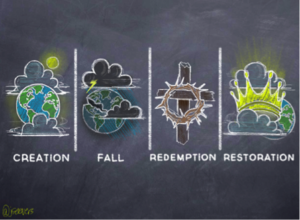
-
-
- How would you explain these parts of the big story?
- Chapter 1: Creation
- God – the Father, Son, and Holy Spirit – made all things, and he made them “good.” Then he made man and woman, and he called them “very good,” because they were made in his image. That meant they reflected God – they could know things with their mind, they could do good things with their will, and they could love others. In fact, God made us to love Him and each other.
- Chapter 2: Fall
- Sin interrupted the whole story and design. Adam and Eve rejected God’s love and authority, so instead of loving God and each other, human beings became self-centered. Sin created brokenness with God, each other, and our world.
- Chapter 3: Redemption
- God could have started over, but instead he decided to redeem and rescue his creation. God the Son came down and became man. He lived a life of perfect love and goodness, but then he died the death of a lawbreaker on the cross. Three days later he rose from the dead! Now, whoever is connected to him can have restoration – a right relationship with God, and the start of a new way of life in the world and with other people.
- Chapter 4: New Creation
- God is not satisfied with just rescuing our souls – he wants to make all things new and better. A day is coming when heaven will come to earth and all things will be made new, so that we will live in perfect peace with God, each other, and our world.
- Chapter 1: Creation
- How would you explain these parts of the big story?
-
Transition: With the big story in mind, let’s think about how our stories fit in…
3. Your Story and The Gospel
- The Gospel Message: The Gospel message tells you how your story fits into God’s story. Remember that we were made to know and love God – to experience a joy-filled relationship with him. But our sin separates us from him. Maybe you’ve visited or seen pictures of the Grand Canyon. The result of our sin means that we are on one side of the Canyon and God is on the other, and there seems to be no hope of being together with him. [2]

-
- But even though we’re separated from God because of our sin, here is what he offers us…
- Grace and Mercy.
- God’s character is so incredible, that instead of giving us what we deserve (punishment and separation), he offers mercy. And on top of mercy, he offers to gives us what we don’t deserve (what we could never earn) – grace. God wants to give YOU grace and mercy. And the way he does is explained in 2 Corinthians 5:21.
- The Great Exchange.
- “For our sake he made him to be sin who knew no sin, so that in him we might become the righteousness of God.” 2 Corinthians 5:21
- In this verse, you can hear two things happening: 1) Jesus took on our sin. Even though he was sinless, he took on the punishment of our sin (became sin). This meant that he died on the cross to pay the penalty of your sin – death. But also, 2) he gave us his perfect life, so that we might become “the righteousness of God.” In other words, we needed a perfect record and Jesus gave us his. This is called the Great Exchange. Jesus exchanged his place for you, his life for yours, his death for you.
- “For our sake he made him to be sin who knew no sin, so that in him we might become the righteousness of God.” 2 Corinthians 5:21
[1] Picture from https://www.outsideonline.com/2367261/grand-canyon-travel-guide
Transition: So how do you know that’s true for you?
4. Respond: Faith and Repentance
- Repentance. Because this is a word that we use in church but not anywhere else, it can be confusing. Repentance is like driving down the highway the wrong way and suddenly admitting it, and then turning around in the right direction. When we repent, we recognize that we’re on the wrong path – it’s not just that we do bad stuff sometimes, but that we live for ourselves. Remember that people can even use religion (keeping all the rules) or irreligion (living however I want) to feel good about themselves. Repentance is admitting that you can’t keep the rules and that you don’t want to live however you want. It means admitting that you’re wrong and that you can’t do anything to fix it.
- Faith. When we turn in the right direction we turn to Jesus. He is the One we look to. If we can’t rescue ourselves, make life work on our own, or draw near to God, then we need him to do all those things. He is the Savior who says, “Come to me, all who labor and are heavy laden, and I will give you rest” (Matthew 11:28). The Gospel is an invitation to trust in Jesus, not just with our mind, but our heart, and will – all of us. If we decide to trust Jesus, it means that we want him to save us, we love him with all our hearts, and we want him to be the most important thing in our lives.
- For you. When someone turns from their sin and trusts in Jesus for the first time, they become a follower of Jesus. And as his followers, God wants us to keep living the same way each day – turning from our sin and trusting in Jesus.
- ASK: Where do you think you are? Have you really admitted that you were on the wrong road – going in the wrong direction – by only living for yourself? And have you turned to Jesus and decided to trust him fully?
- PRAY for a new relationship by faith: If not, then pray together to turn from self and sin, and turn to Jesus in faith. Parents, you can guide your kids through that prayer, or model it for them and allow them to pray in their own way.
- PRAY to continue your relationship in a new way: If you’re son or daughter is already a follower of Jesus, then remind them that every time we hear the gospel message, it’s an invitation to follow Jesus in a new way – with greater love and commitment to him. In fact, God wants us to keep on looking to Jesus with love and faith. Pray to that end, taking time to silently confess sin, and then turning to Jesus by faith.
- ASK: Where do you think you are? Have you really admitted that you were on the wrong road – going in the wrong direction – by only living for yourself? And have you turned to Jesus and decided to trust him fully?
5. The BIG Picture GOAL: To respond to the Gospel message, for the first time or in an ongoing way.
- Remember, the Gospel is not “do,” it is “done.” Jesus accomplished what we couldn’t, and now we’re invited to receive his work by faith.
6. For next time…
- Kids and parents: Read Mark 12:28-31 and Matthew 28:16-20
[1] https://www.christianitytoday.com/edstetzer/2012/november/big-story-of-scripture-creation-fall-redemption.html
[2] Picture from https://www.outsideonline.com/2367261/grand-canyon-travel-guide
Finding Life: Session 6
Erin2020-12-21T10:00:57-05:00December 21st, 2020|
1. Opening up
- Review:In Mark 13-15, we discussed the topic of suffering. Even though suffering can be hard to endure and understand, we saw that that Jesus, the innocent Son of God, suffered for you.
- Homework: Our homework was to answer the following: Where are you suffering right now? How does this truth – that Jesus suffered for you – encourage you?
- ASK: how did you answer that question?
- ANSWER: Parents, feel free to share your own answers.
- Pray: Having just discussed suffering, thank Jesus that he willingly suffered for us. Then ask the Spirit to lead your study.
Transition: If you’re familiar with the Resurrection in Mark 16 then it’s easy to skip past it and not think about what it means. Instead of doing that we’re going to think about why the Resurrection matters…
2. Struggling with doubts
- Doubts: Lots of people struggle to believe. That’s true for Christians and skeptics. It’s hard to believe what you cannot see. And if you think about it, even the atheist (who doesn’t believe in God and only believes that science can explain our world) should have doubts. No one can go back in time and prove the scientific theories he believes in. The point is this, everyone should expect to have doubts about their big beliefs. The question is, what do we do with our doubts?
- Parents: the following quote may be over the head of your son or daughter, depending on their age. If so, simply communicate the gist of the quote, which is that we should explore our doubts; that there is actually something healthy about exploring your doubts.
- “A faith without some doubts is like a human body without any antibodies in it. People who blithely go through life too busy or indifferent to ask hard questions about why they believe as they do will find themselves defenseless against either the experience of tragedy or the probing questions of a smart skeptic. A person’s faith can collapse almost overnight if she has failed over the years to listen patiently to her own doubts, which should only be discarded after long reflection.”[1]
- Big point: Here’s the beauty of the Bible: it invites you to “come and see.” It welcomes your exploration and your questions. God reveals the Gospel of His Son with evidence. God’s Word certainly tells us that it comes from God and that we should believe it. But instead of angrily dismissing skeptics, God’s Word gives evidence and eyewitness accounts to prove its truth.
- ASK: have you ever struggled with doubt? In what ways?
- ANSWER: Parents, maybe you can share your own struggles and how God overcame them. For me (Jordan), there was a season several years ago when I really struggled to believe some of the stories I read in the Bible. In time, God overcame my doubts in two ways: 1) by answering my prayers asking for faith and belief, and 2) by reminding me of the Resurrection of Jesus. The point to make is this: if we struggle to believe, the place to come back to is the Resurrection. All of Christianity hinges on the Resurrection. As Paul says, if it’s not real, then give it all up (eat, drink, and be merry…). But if it’s real then the Resurrection changes EVERYTHING.
Transition: Everything hinges on the Resurrection. So let’s consider the evidence…
3. The Evidence of the Resurrection
- The account: Read Mark 16:1-8. Notice that there are three shocks that grow in intensity.[1]
- The stone was rolled away. The stone that covered the tomb of Jesus was massive. The other Gospel accounts tell us that it was guarded by Roman soldiers. For the stone to be rolled away (“hurled away” in the Greek language) would have been a complete shock to the women who came to the tomb.
- An angel appeared! A young man dressed in a white robe appeared to the women. Matthew tells us that this was an angel. The women would have been shocked again to discover this unique messenger, who was there to deliver a message.
- He is risen! The greatest shock of all, was the angel’s message: “Do not be alarmed. You seek Jesus of Nazareth, who was crucified. He has risen; he is not here…” The idea of resurrection would have been just as crazy to the ancient world, as it is to our world. He’s alive? How could that be possible?
- Evidence. When our world thinks about an event like this, the first question they normally ask is this: “Is this scientifically possible?” But if God is real and Jesus was God (as He claimed to be), then it should not surprise us that He has power over death. The question we should ask instead is: “does the evidence make sense?” And, “is it believable?”
- ASK: what evidence here helps you believe in the Resurrection? (brainstorm together)
- ANSWER: the following are examples that show the strength of the eyewitness testimony:
- It passes the “cover-up test”: if a court of law was examining someone’s story they would want to make sure the person was not trying to hide something or cover-up the real details. Mark presents the details in a way that doesn’t make the eyewitnesses seem too impressive: they are fearful women, who forget that Jesus foretold of His Resurrection. Further, if you were making up a story in the ancient world you would not want women to be your first eyewitnesses. Sadly, women were not allowed to testify in court in the ancient world. But in the most important story in the Bible, God puts women front and center. They are the first eyewitnesses and that makes it even more likely that this story was NOT made up.
- It passes the “bias test”: Were the eyewitnesses biased, meaning they already had their minds made-up about Jesus? Certainly, these women and the disciples believed Jesus and trusted him. But after Jesus died, the other accounts tell us that the disciples were very scared, huddled in a room together, worried that the authorities would soon be after them. But the Resurrection changed their perspective. They were no longer ruled by fear, even though they had every reason to be afraid. When you really think about it, the disciples of Jesus had nothing to gain in this life by going out and proclaiming Jesus. But that’s exactly what they did after the Resurrection changed everything. And all of them gave their life in the process, dying because they were followers of Jesus. That passes the bias test.
- It passes the “corroboration test”: Do the stories fit together? If you read all the different accounts of the Resurrection, you’ll notice that they fit together. Yes, they have different details but their details all line-up. In fact, Paul tells us in 1 Corinthians 15 that Jesus appeared to more than 500 people at once, after His Resurrection! In other words, 500 people could tell you the same thing – we all saw Jesus at the same time!
- The spread of Christianity! What’s so amazing is that after the Resurrection, Christianity spread like wildfire. It went from a small band of 12 disciples to covering nearly the whole Roman Empire, becoming the religion of 33 million people by 350 AD. There’s only one thing that could account for that kind of rapid spread – the true story of the Resurrection.
[1] What follows is taken from Stephen Phelan, Training Session 6: Did Christ’s Resurrection Happen? at https://movementmentoring.live/training-session-6-lifes-big-questions-did-christs-resurrection-happen/.
Transition: It’s really important to consider the evidence for the Resurrection. When you do, it becomes even clearer that the Resurrection of Jesus really happened. But we can also point to one more bit of evidence…
4. Transformation and Power
- ASK: have you ever seen someone’s life transformed by Jesus?
- ANSWER: Parents, share your own story of how Jesus transformed your life. As you do, consider the following questions: What does the Resurrection mean to you and how has it changed you? Where have you seen God’s resurrection power overcome idols and sin patterns in your life? Have you seen God do that in the lives of others as well?
5. The BIG Picture GOAL: to see that the Resurrection is real and that it changes everything.
- If the Resurrection really happened, then it changes everything. Jesus rising from the dead is not just interesting information. The Resurrection is the most incredible news – news that has been transforming the hearts of men, women, and children for the last 2000 years!
- Homework: think about the Resurrection. What does the Resurrection mean for your life?
6. For next time…
- Choose the day and time for your next study.
- Kids and parents: Read 2 Corinthians 5:21.
Finding Life: Session 5
Laura2020-12-21T10:02:18-05:00December 17th, 2020|
1. Opening up
- Review: Mark 1-4 answered the question, “who is Jesus?” Mark 5-8 showed us that the religious and irreligious approaches look for life apart from Jesus. But Jesus came to heal the sick, so true life only comes by looking to him for healing. In Mark 9-12 we focused on forgiveness. We need to forgive others and be forgiven by God.
- Homework: Our homework was to ask two questions: 1) Who do you need to truly forgive? 2) Why do you need God’s forgiveness?
- ASK: how did you answer that question?
- ANSWER: Parents, feel free to share stories about how you’ve seen forgiveness give life to someone, both horizontally (between two people) and vertically (with God).
- Pray: Having just discussed forgiveness, thank God for His grace through the Lord Jesus. Then ask the Spirit to lead your study.
Transition: In these chapters, we begin to read about different kinds of suffering.
2. Suffering in the world
- Context: Many people find Mark 13 to be a very confusing chapter. Because of this, there are many different opinions on the exact meaning of Jesus’s words here. However, without getting lost in the little details, we can clearly make some big picture observations about Jesus’s teaching. As Jesus and His disciples were leaving the temple (the place where the Jewish people worshipped in Jerusalem), one of his disciples was marveling to Jesus about the size and beauty of the temple buildings. The temple complex was massive in size and adorned in marble and gold. Some of the stones were 16 feet long! Jesus used this comment about the temple to teach the disciples about destruction that would come upon the temple, suffering in the world, and the end of time.
- Why do we suffer?
- In chapter 13 Jesus talks about all kinds of suffering. He mentions wars, natural disasters (earthquakes), famines, the persecution of Christians, division in families, destructive false teaching and more. Jesus is honest about the world that we live in. He doesn’t pretend like everything is ok, but plainly teaches about real suffering.
- ASK: When you think about suffering what comes to mind? How have you suffered? How has your family suffered?
- Suffering is really hard. And when you’re in the middle of suffering, it’s even harder to understand it or make sense of what’s happening. That’s why it’s so important to understand what God teaches us during times when we’re not going through hard suffering.
- ASK: If you were going to explain the Bible’s teaching on suffering to someone what would you tell them? What does the Bible teach about suffering? Why do we suffer?
- *Brainstorm together to highlight important Biblical teaching on suffering. Some examples could include: Sin has led to suffering. The wages of sin is death (Romans 6:23). When Adam and Eve sinned, suffering and death entered into our world, which tells us something very important about suffering – it began with sin. That does not mean that when someone suffers it’s because they sinned and God is punishing them. Jesus taught that we shouldn’t think that way. We also know that God entered into our suffering by sending Jesus. And we know that God promises to work everything – even suffering – for our good.
Transition: Now think back to Jesus’s teaching on suffering, all the way through Mark. Here are a few things he has shown us…
3. Suffering points to sin and judgment
- Our deeper problem: Sin. Remember back to Mark 2, when the paralytic man was lowered through the roof by his four friends in order to see Jesus? Instead of first healing the man’s body, Jesus said something striking: “your sins are forgiven.” Why would he do that? To show us that there is a deeper problem than our broken bodies. Suffering in this life points to a deeper problem: our sin problem. The reason suffered into the world was because of sin. So if we really want someone to fix our suffering problem, then they need to fix the deepest problem – our sin problem.
- Judgment. But there’s another problem, sin brings judgment. If God is good then he must judge sin. If you think back to World War II in Nazi Germany, as Hitler and the Nazis began killing the Jews, many of the Nazi officers killed Jews simply because they were told to do it. In addition to that, most of the German citizens did nothing to stop the evil or speak against it. Few people in Germany were judging the evil commands and wicked deeds. We easily recognize how wrong that was because something deep down inside of us believes in justice. We want Someone good to make sure that good laws are followed.
- ASK: can you remember a time in life when you were thankful for judgment – when justice upheld the law? (Parents, share your own answer)
- On the one hand, we should be thankful that God is just and upholds the law. But on the other hand, it creates a big problem for us. We are sinners. Sin is breaking God’s law and running away from His good commands. Because of that, in Mark 13 Jesus is saying that one day God will bring all things to an end, and he will judge sin. The message is clear: all of us our sinners and in our sin we deserve to be judged. Suffering reminds us of that.
Transition: That’s bad news. But here is what’s so incredible about the story of Jesus…
4. Jesus came to suffer
- He suffered through judgment: Remember that Jesus was completely innocent. He was without sin. He always did what was right. But in Mark 14 and 15, he was judged as a guilty. The innocent One was declared guilty. He was judged as a lawbreaker.
- ASK: in what ways was Jesus treated unfairly in Mark 14 and 15? How does that make you feel?
- He suffered through physical suffering: Not only was Jesus judged, he was mistreated. He suffered in horrific ways through physical punishment.
- ASK: in what ways did Jesus suffer in Mark 14 and 15? How does that make you feel?
- He suffered through death: on the cross Jesus cries out “My God, my God, why have you forsaken me?” The Father has turned away and allowed him to die as a guilty criminal.
5. Responding to Jesus
- The question for us is: how will we respond to Jesus? We see several different responses in Mark 15.
- ASK: what are the different responses to Jesus in Mark 15?
- People-pleasing Pilate: he believed Jesus is innocent, but instead of letting him go free, Pilate had Jesus crucified. Why? Because he cared about the approval of other people more than he cared about Jesus.
- Mockers: some people mock Jesus because they look at his weakness and conclude that he is a failure. Little did they know, he was using his weakness to defeat sin and death.
- The Religious people: the Pharisees also mock Jesus, because they were so confident in their own “good” works. They think they are righteous because of their own actions, and therefore that they didn’t need Jesus.
- The Busy Soldiers: the soldiers were too busy obeying orders and not paying attention to the evil deeds in front of them. Their busy-ness kept them from seeing what’s really happening.
- The Roman Centurion. Here was the one person who really was able to see Jesus. A Roman Centurion would have been a battle-tested soldier, in charge of many men, and a person who witnessed many deaths. He most likely oversaw dozens, if not hundreds of crucifixions in his life. But he looked at the crucifixion of this man and the way that he died, and made a startling conclusion: “Truly this man was the Son of God” (15:39).
- ASK: what are the different responses to Jesus in Mark 15?
6. The BIG Picture GOAL: to see that Jesus, the innocent Son of God, suffered for you.
- It’s no accident that Mark finished the crucifixion with the Roman Centurion’s testimony. Jesus, the Son of God, was innocent but he suffered and died. Why? He did it for you, for me, and for all of those who trust in Jesus.
- ASK: do you agree with the Roman Centurion’s testimony?
- Homework: think about your own suffering? Where are you suffering right now? How does this truth – that Jesus suffered for you – encourage you?
7. For next time…
- Choose the day and time for your next study.
- Kids and parents: Read Mark chapters 16 and 1 Corinthians 15:3-8. If this will be a challenge for your son or daughter, read it together over a few days. Read it, or listen to it using a Bible app, like the ESV Bible app or the YouVersion Bible app.
- Parents, look over the next lesson… coming soon!
Finding Life: Session 4
Laura2020-12-17T14:11:42-05:00December 10th, 2020|
Session 4: Forgiveness
1. Opening up
- Review:Mark 1-4 answered the question, “who is Jesus?” Mark 5-8 showed us two different approaches to life that are still common today: the religious and irreligious approaches. Someone who takes the religious approach uses religion and rule keeping to feel good about themselves, to earn blessings in life, and to look down on others who are not religious (us versus them). The person who takes the irreligious (or non-religious) approach ignores or breaks the rules and lives however they want. They think they’ll be happy and have the best life if they call all the shots, make their own decisions, and decide what’s right and wrong. In the end however, neither the religious or the irreligious approach lead to life. Jesus came to heal the sick. To be healed and find life, you need to admit you are sick.
- Homework: Our homework was to do the “Thought Experiment” where we imagined our lives depicted on an art gallery wall, with everything we’ve ever done, said, or thought painted as a mural for everyone to see. Have you thought about that? What did it feel like? (Parents, you don’t need to get the details from what was on your child’s wall. Instead, try to understand what the process felt like for them. Appropriately, share your own realizations.)
- Pray: Having just reviewed the Thought Experiment, thank Jesus that He came to heal the sick. Then ask the Spirit to lead your study.
Transition: In these chapters we begin to see why Jesus came. He came to deal with a massive issue that relates to every person ever born: forgiveness.
2. QUESTION: What is forgiveness?
- In Mark 9-12, Jesus does and says many things that begin to deal with the theme of forgiveness. Before we look at them, we need to think about what forgiveness is and why it’s needed.
- Forgiveness defined:
- ASK: When most people say I forgive you, what do they mean? What are they saying?
- *ANSWER: It often seems like when people try to forgive someone, what they are actually doing is excusing or over-looking the wrong done. It’s like saying to one another “forget about it” or “don’t mention it;” maybe even acting like it didn’t happen. Some people call that “brushing it under the rug.” Oftentimes, when people “forgive” they are doing something like that, which means they are excusing it without acknowledging the COST of forgiveness.
- ASK: What is your favorite valuable possession? Let’s imagine a scenario where your friend borrowed the possession without asking and broke it, beyond repair. Now if you really forgave your friend the debt, what would it mean for you?
- *ANSWER: If you actually forgave the debt owed for the item, it would mean you would experience a loss. Either you would no longer have the valuable possession in working order, or you would have to pay to replace it. When it comes to forgiveness with things, there is a cost to forgiving a debt.
- *But don’t miss this: When it comes to relationships there is also a cost to forgiveness. In fact, there is an even greater cost to forgiveness. And the greater the wrong done, the more costly the forgiveness.
- ASK: Can you think of examples of this in any of your relationships?
- Knowing this helps us get to a right understanding of forgiveness. Forgiveness means naming the wrong done and paying the cost of it. In other words, if my friend teased and made fun of me, forgiving him or her would mean that I both acknowledge the wrong (it is wrong and hurtful to mock someone) and committing to pay for the debt (meaning that I will keep our friendship and not hold the wrong against them).
- ASK: When most people say I forgive you, what do they mean? What are they saying?
- This should change the way we think about forgiving each other. If forgiveness means paying or absorbing the debt of a wrong, then we can see why forgiveness is difficult. Sometimes it takes time to really forgive someone. The greater the wrong done and the more frequently it is committed, the more difficult it is to forgive.
- Application: is there anyone in your life you need to forgive?
Transition: that can be a hard question to consider. But to find true life, we need to be people who pursue forgiveness. If we don’t, then we will be filled with bitterness and anger over time. The secret to forgiving others is to begin experiencing forgiveness yourself…
3. Experiencing forgiveness from God
- Relational problems with God:
- Think about what we just talked about: 1) Forgiveness in relationships costs something. Instead of just excusing someone, when you forgive them you are saying “I will pay for your debt. I will clear away the wrong you did against me.” 2) If someone repeatedly wrongs us it makes it harder to forgive them, because the cost is even greater.
- *ASK: With those things in mind, what does this teach us about our relationship with God?
- *ANSWER: If we remember our “Thought Experiment” we know that we have repeatedly wronged God. He made us and cares for us moment by moment. Yet when we ignore His authority and His Word (which He gave for our good), we wrong Him. He have damaged our relationship with God again and again. Because of that the cost of forgiveness is very great.
- Think about what we just talked about: 1) Forgiveness in relationships costs something. Instead of just excusing someone, when you forgive them you are saying “I will pay for your debt. I will clear away the wrong you did against me.” 2) If someone repeatedly wrongs us it makes it harder to forgive them, because the cost is even greater.
- Jesus’s Mission:
- If we understand the cost of forgiveness, we can begin to understand why Jesus had to come. Read these two passages and answer the question: Why did Jesus come?
- *Mark 8:31 “And he began to teach them that the Son of Man must suffer many things and be rejected by the elders and the chief priests and the scribes and be killed, and after three days rise again.”
- *Mark 10:45 “For even the Son of Man came not to be served but to serve, and to give his life as a ransom for many.”
- Jesus came to pay the price of our forgiveness. He came to suffer on the cross by giving his own life. And he gave that life as a ransom.
- *In the ancient world where Jesus lived, a “ransom” was the price paid to release a prisoner of war. If an enemy soldier wasn’t killed in battle, he was captured and enslaved. So when someone paid the ransom for his freedom, they were literally freeing him from slavery. This is a great picture of the work of Jesus for us: he died to pay our debt and ransomed us from slavery to sin and selfishness.
- If we understand the cost of forgiveness, we can begin to understand why Jesus had to come. Read these two passages and answer the question: Why did Jesus come?
- Why? As we put all this together, we start to see why Jesus came and why he had to die. Let’s finish by answering that question.[1]
- ASK: If you had to explain this to someone, how would you answer the question: Why did Jesus have to die? (brainstorm together)
- ANSWER:
- To pay your debt. As discussed already, the wrongs we have done against God and others have created a massive distance between us and God. Our sin has created relationship problems with God because we have repeatedly wronged Him. The cost of forgiveness is so large that we could never pay it. Jesus came to pay it for us.
- To deal with justice. Someone might ask, why can’t God just forgive us? The answer has to do with the cost of forgiveness. If our wrongs are simply excused and no payment made, then there is no justice. Think about one more example: imagine someone breaks into your house and destroys all of your family’s Christmas presents. Sadly, each and every gift is demolished into thousands of pieces. Imagine that as you come home and make this horrible discovery, there is a police officer at the front door with the criminal under arrest! As you begin talking to the officer you find out that this Grinch-like criminal has done the same thing at several other homes in the area. But just then, the criminal begins to sincerely ask for forgiveness. He seems genuinely sorry. What should you do? Would anyone really want to ask the police officer in that moment to let this Grinch go free? No! First, he has destroyed the property of several people and should be held responsible to replace it. Second, it would be unloving to all of your other neighbors because this criminal could do the same thing to them if he was just simply released. The point is this: the law matters! Laws are in place to protect people and treat others with respect and kindness. God has loved us and our world by giving us His law. If God simply ignored all the law-breaking then He would not be just. He wouldn’t be loving us with the law. Jesus came to so that the penalty of breaking the law could be paid.
- To rescue us. God shows us His perfect wisdom in saving us. Jesus died so that God could both be a just Ruler (who loves and upholds the law for our good) and save us (from our sin and the debt we owe). This is the meaning of Romans 3:23-26. God neither “gave up” on us or “gave in” to our sin. To accomplish that took perfect wisdom! In the example used above, if the criminal asked for forgiveness AND someone came in to pay for the all the broken presents on his behalf, then both mercy and justice could be upheld. The cost of forgiveness would be paid and forgiveness would be granted to the repentant criminal. And if that happened, chances are the criminal’s heart would begin to be changed. The good news of Mark is that Someone came to pay for the cost of forgiveness.
- To free your heart.
- ASK: Have you ever heard of someone giving their life for another person? Can you think of an example?
- ANSWER: Parents, if you know of a sacrificial story then share it here. One possible example is the story Arland D. Williams.[2] Arland was a passenger aboard Air Florida Flight 90. There are three bridges on the Potomac River named after him. On January 13, 1982, Flight 90 crashed right after take-off and went down into the icy Potomac River. As the plane began sinking, a helicopter hovered over the tail area to rescue passengers. Arland was the first passenger who could have grabbed hold of the helicopter ladder and climbed to safety. Instead, he pulled passengers out of the plane and gave them his spot on the rescue ladder. Then he did it again and again and again. He kept on doing it until finally he died, giving his life to rescue the other passengers.
- This is what Jesus did for you. He gave His life for yours, to save you. When you begin to realize that he did this for you, it begins to free your heart from selfishness. Jesus died for you, to free you, because He loves you.
[1] The following list in part comes from Tim Keller in a sermon entitled “Become a Little Child” preached on April 1, 2001.
[2] Told by Tim Keller in a sermon entitled “Become a Little Child” preached on April 1, 2001. Illustration begins at the 34:45 minute mark.
Transition: in summary, here’s the big picture of Mark 9-12…
4. The BIG Picture GOAL: to see that true forgiveness is costly. Finding true life means giving forgiveness out and experiencing God’s forgiveness. Jesus came to pay for our forgiveness.
- Homework: this week, think about forgiveness. Who do you need to truly forgive? Why do you need God’s forgiveness?
5. For next time…
- Choose the day and time for your next study.
- Kids and parents: Read Mark chapters 13-15. If this will be a challenge for your son or daughter, read it together over a few days. Read it, or listen to it using a Bible app, like the ESV Bible app or the YouVersion Bible app.
- Parents, look over the next lesson… coming soon!



